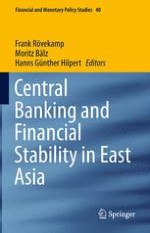2015 | OriginalPaper | Buchkapitel
Navigating the Trilemma: Central Banking in East Asia Between Inflation Targeting, Exchange-Rate Management and Guarding Financial Stability
verfasst von : Ulrich Volz
Erschienen in: Central Banking and Financial Stability in East Asia
Aktivieren Sie unsere intelligente Suche, um passende Fachinhalte oder Patente zu finden.
Wählen Sie Textabschnitte aus um mit Künstlicher Intelligenz passenden Patente zu finden. powered by
Markieren Sie Textabschnitte, um KI-gestützt weitere passende Inhalte zu finden. powered by
